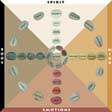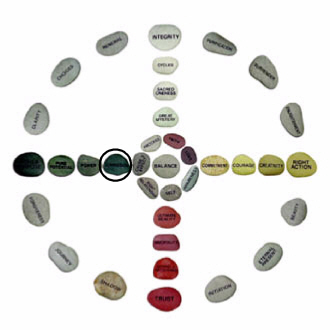  |
|
|
|
Compassion is active, not passive. It flows most easily from those who are deeply grateful… We must know what it is to love and be loved.
Excerpted from the Wisdom Wheel Compassion card |
|
|
|
Your Study Schedule for This Law |
|
|
| Full moon Sat November 24 2007 begin Week One – East quadrant – Mental, intellectual aspects |
| Last quarter Sat December 01 2007 begin Week Two – South quadrant – Emotional aspects |
|
New moon Sun December 09 2007 begin Week Three – West quadrant – Physical and intuitive aspects |
|
First quarter Mon December 17 2007 begin Week Four – North quadrant – Spiritual aspects |
|
|
|
Next full moon Mon December 24 2007 begin next Law of Cycles
|
|
|
|
Introduction to the Law of Compassion
|
|
|
|
Compassion is the ultimate and most meaningful embodiment of emotional maturity. It is through compassion that a person achieves the highest peak and deepest reach in his or her search for self-fulfillment. As you begin your study of Compassion, consider its mental, emotional, physical and spiritual characteristics for a moment. How does Compassion (or the lack of it) affect your head, your heart, your body and your spirit? Now look at where Compassion is on the Wheel. Why are the Laws of Power & Pure Potential grouped with it, in the Healers Lodge; the place of the Body, the senses, dreams, intuition, Death & Rebirth? Our sensitivities, senses and physical bodies must be involved if we’re going to translate Compassion into Right Action. If Compassion remains just an idea in our minds, nothing changes. When we feel it in our hearts our hands move. We see someone suffering and we can respond. Spirit can move through us, activating the Potential and Power of the other person, so they can survive, heal and thrive. Then they can be compassionate towards others in the future. This is the way Cycles are established. The Law of Cycles comes after Compassion. Each day we are contributing to Cycles which are vicious or virtuous, depending upon the principles we live by, and the quality of our deeds. The Law of Commitment balances Compassion. This implies that we need to follow-through from ideas to actions. Once we can sense the suffering in this world, appropriate responses need to be completed. Here are some homework questions for you; -What have you learned about Commitment and Compassion after 33 months on the Wheel? -Which emotions are most effective when it comes to instilling Compassion? Pity? Guilt? Fear? Empathy? Threats? Praise? Punishment? -How do the Choices we make to be hard or soft towards others (and ourselves) relate to Compassion, fear and Love? -Does Compassion seek to dominate or elevate? -Is it easier to have Compassion for someone beneath you or for someone with Power over you? -Can authority figures show Compassion without undermining their Power and authority? As always, we hope you are using each Law as a keyword to search for the latest books on these subjects. Marc Ian Barsch has written a top rated Compassion books, Field Notes on the Compassionate Life Jesus was not the only one who said, Love your enemies, bless them that curse you, do good to them that hate you. Gandhi and other Asian sages have given similar advice, as you will see in the entries this month about other compassionate archetypes, such as the Goddesses Tara, Avalokitesvara and Kuan Yin. The Dalai Lama and other Tibetan Buddhists strive to embody the Law of Compassion. What has happened in
The peace-loving Tibetans are mountain people and the Chinese Communists want to destroy their way of life and convert them to Communism. Because Compassion is a core Tibetan Buddhist belief, they have not resorted to violence to fight back. The Dalai Lama, after 40 years in exile, will not advocate using force to repel the Chinese. To hit back means you have succumbed to violence. How long could you respond with Compassion if you and your relatives were being beaten, tortured and killed? Is it better to die than to lose your Compassion? If you have time for another book this month read The Rainbow Palace This ‘harrowing spiritual memoir’ was written by the personal physician of the 14th Dalai Lama who explains what it’s like to personally fight a values war. He witnessed and endured more than 20 years of horrific atrocities in Chinese prisons. The details will turn your stomach, yet he does not advocate punishing the Chinese. Instead he desires their betterment! He wants to teach them by being a good example of Compassion. He focuses on restraining and transmuting his own rage and anger. As a monk doctor, he was called upon to treat and heal his Chinese jailers. He did so with unconditional tolerance, actually working to heal the very people who have done so much harm; beating, starving and humiliating him and so many others. He writes of how he did this. ‘I succeeded in distancing this feeling of anger through meditation, prayers and respect for the teachings of the Dharma…The great master Aticha says in The Light of the Way: He who, on the basis of an understanding of his own suffering, develops the desire to assuage another, for all sorts of suffering, is qualified as a superior being.’ He is not smug about this but it must enrage the Chinese, or anyone else, who vainly struggles to achieve such serenity without working on their anger. His message is clear. We must work on ourselves, not blame others. Like Forgiveness, Compassion begins at home. I was shocked to learn that so much corporeal punishment was used in the monasteries before the Chinese invasion. Even in a culture of Compassion not everyone adheres to it. Perhaps this early suffering taught Tenzin never to inflict the same pain on anyone else. How have your learned your Compassion lessons? They say “the wounded healer is the best healer” once they have healed themselves. Don’t forget Compassion for your Self this month. Many blessings, Malcolm and Cynthia Davidson
|
|
|
|
Copyright © 1999-2006 TouchStoneCenter All rights reserved
|
 Welcome to the Wisdom Wheel Law of Compassion # 33
Welcome to the Wisdom Wheel Law of Compassion # 33